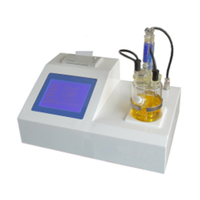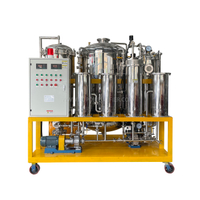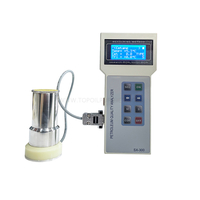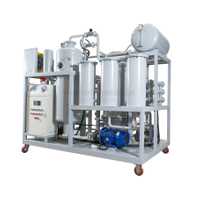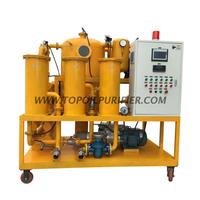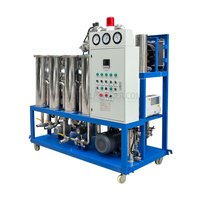Construction sites are busy and hazardous environments. With heavy machinery constantly in use, the risk of fire is a constant concern. To protect both personnel and equipment, it is crucial to have effective fire resistance oil purification systems in place. These systems play a vital role in maintaining the quality of hydraulic oil, ensuring it remains fire resistant and capable of withstanding high temperatures.
Understanding fire resistance oil purification systems is essential in making informed decisions about which system to choose for construction site machinery. These systems are designed to remove contaminants, such as dirt, water, and particles, from hydraulic oil, ensuring its optimal performance and longevity. By purifying the oil, fire resistance is enhanced, reducing the risk of combustion and protecting expensive machinery from damage.
When selecting a fire resistance oil purification system for construction site machinery, there are several factors to consider. The first is the system's filtration efficiency and capacity. A high-quality system should be able to remove even the smallest particles and impurities, ensuring the oil remains clean and free from debris. Additionally, the system should have a sufficient capacity to handle the volume of oil used on the construction site, ensuring continuous operation and minimal downtime.
Another crucial factor to consider is the system's ease of use and maintenance requirements. Construction sites are fast-paced environments, and any downtime can have significant financial implications. Therefore, it is important to choose a system that is easy to operate and maintain, with minimal time and effort required for routine maintenance tasks such as filter replacement.
In conclusion, fire resistance oil purification systems are essential for construction sites to mitigate the risk of fire and protect valuable machinery. By understanding the function of these systems and considering factors such as filtration efficiency and maintenance requirements, construction site managers can make informed decisions when choosing the most suitable system for their needs.
Understanding Fire Resistance Oil Purification Systems
Fire resistance oil purification systems are essential in industries where the risk of fire is high, such as manufacturing plants, power plants, and oil refineries. These systems play a crucial role in preventing and mitigating fires by removing contaminants and impurities from the oil, thus increasing its resistance to fire.
One of the key components of a fire resistance oil purification system is the oil purifier. This device is designed to remove solid particles, water, and other contaminants from the oil, ensuring its purity and enhancing its fire resistance properties. By eliminating these impurities, the oil can better withstand high temperatures and prevent combustion.
These additives act as a protective layer, forming a barrier between the oil and the ignition source. This layer helps to prevent the oil from catching fire and spreading flames in case of an accident or malfunction.
Fire resistance oil purification systems also include advanced filtration systems. These systems use various filtration techniques, such as depth filtration and membrane filtration, to remove even the smallest particles and contaminants from the oil. By maintaining the oil's cleanliness, the risk of ignition and fire is greatly reduced.
Apart from their fire resistance properties, these purification systems also offer other benefits. They help to extend the lifespan of the oil, reducing the need for frequent oil changes. This not only saves costs but also minimizes the environmental impact of oil disposal. Moreover, by keeping the oil clean and free from contaminants, these systems contribute to the overall efficiency of the machinery and equipment that rely on the oil for lubrication and cooling.
Factors to Consider when Choosing Fire Resistance Oil Purification Systems
When it comes to choosing fire resistance oil purification systems, there are several factors that need to be considered. These systems play a crucial role in industrial settings where the risk of fire is high, as they help remove impurities from the oil and ensure its resistance to fire. In order to select the right system for your specific needs, it is important to keep the following factors in mind.
First and foremost, it is essential to assess the level of fire risk in your facility. Different industries have different levels of fire hazards, and it is important to choose a fire resistance oil purification system that can handle the specific risks associated with your industry. This will help ensure that the system is capable of effectively purifying the oil and maintaining its fire resistance properties.
Another important factor to consider is the capacity of the system. The size of your facility and the amount of oil that needs to be purified on a regular basis will determine the capacity requirements of the system. It is important to choose a system that can handle the volume of oil in your facility without compromising its efficiency. This will help prevent any bottlenecks in the purification process and ensure a continuous supply of purified, fire-resistant oil.
Additionally, the efficiency and effectiveness of the system should be taken into consideration. Look for a system that utilizes advanced filtration techniques to ensure thorough purification of the oil. This will help remove contaminants and impurities that can compromise the fire resistance properties of the oil. A highly efficient system will also help minimize downtime and maintenance costs, allowing for smooth operations in your facility.
Maintenance requirements are also an important consideration when choosing a fire resistance oil purification system. Regular maintenance is essential to keep the system in optimal condition and ensure its longevity. Look for a system that is easy to maintain and has readily available spare parts. This will help minimize downtime and ensure that the system continues to operate at peak performance.
Conclusion
In conclusion, fire resistance oil purification systems are crucial for industries where fire hazards are prevalent. These systems not only purify the oil but also enhance its fire resistance properties, reducing the risk of ignition and fire. By incorporating advanced filtration techniques and fire-resistant additives, these systems ensure the purity and integrity of the oil, contributing to the safety and efficiency of industrial operations. Implementing a fire resistance oil purification system is a wise investment for any industry that prioritizes safety and wants to minimize the risk of fire incidents.











